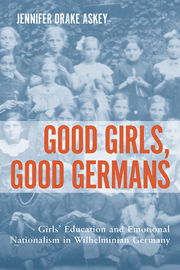Book contents
- Frontmatter
- Dedication
- Contents
- Acknowledgments
- Introduction: Emotional Nationalism and Germany’s Daughters
- 1 Nationalist Education and Prussia's höhere Töchter
- 2 Father's Library: German Classics in Girls' Schools and the Ownership of German Culture
- 3 Mädchenliteratur I—Backfischbücher and Historical Novels
- 4 Mädchenliteratur II—Queen Luise
- Conclusion
- Bibliography
- Index
2 - Father's Library: German Classics in Girls' Schools and the Ownership of German Culture
Published online by Cambridge University Press: 05 August 2013
- Frontmatter
- Dedication
- Contents
- Acknowledgments
- Introduction: Emotional Nationalism and Germany’s Daughters
- 1 Nationalist Education and Prussia's höhere Töchter
- 2 Father's Library: German Classics in Girls' Schools and the Ownership of German Culture
- 3 Mädchenliteratur I—Backfischbücher and Historical Novels
- 4 Mädchenliteratur II—Queen Luise
- Conclusion
- Bibliography
- Index
Summary
The preceding examination of Lesebücher reveals that the German classics, that is, literature of Weimar classicism, occupied a position of highest importance in the educational mission of the höhere Mädchenschule in imperial Germany. celebrated both as the greatest literature Germany had to offer and as a testament to the development of the German Kulturnation, classical works by Goethe, Schiller, and Lessing dominated the German curricula of the girls' school. Knowledge of canonical literature from the age of Goethe marked young middle-class women as well educated and respectable, and a close familiarity with works such as Hermann und Dorothea, Wilhelm Tell, “Das Lied von der Glocke,” and Minna von Barnhelm was believed to foster love and appreciation for a particular German manifestation of genius. pedagogues proclaimed the benefit of both the content and the form of classical texts to be cornerstones of the German curriculum, as these highlighted the role of girls and women in German culture and provided a common point of linguistic and cultural reference for an emergent middle class.
Through recitation and memorization of the texts, as well as declamation and performance, girls were made familiar with the contents of the works and with the rhythms and vocabularies of high German. The German language and literature curriculum in the Mädchenschule and Töchterschule focused on the character and temperament of signature female protagonists in selected works and guided toward identification with a nationalist and patriarchal interpretation of German womanhood.
- Type
- Chapter
- Information
- Good Girls, Good GermansGirls' Education and Emotional Nationalism in Wilhelminian Germany, pp. 59 - 102Publisher: Boydell & BrewerPrint publication year: 2013



